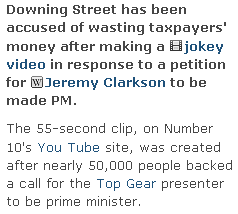This could be fantastic – I hope the BBC will work with the museum sector to complement the work they're already doing or planning to get their collections online. From the Guardian, BBC to put nation's oil paintings online:
A partnership with the Public Catalogue Foundation charity will see all the UK's publicly owned oil paintings – 80% of which are not on public display – placed on the internet by 2012.
The BBC said it wanted to establish a new section of its bbc.co.uk website, called Your Paintings, where users could view and find information on the UK's national collection.
The Public Catalogue Foundation, launched in 2003, is 30% of the way through cataloguing the UK's collection of oil paintings.
In addition the BBC said it was talking to the Arts Council about giving the public free online access to its archive for the first time, including its wide-ranging film collection dating back to the 1950s.
…
[Mark Thompson, the BBC director general, said:] "Today we are not only reaffirming our commitment to arts, but we're announcing a series of measures that will put this relationship on an even stronger footing. Through innovative new partnerships, I believe the BBC can deliver big, bold arts programming that is accessible, distinctive and enjoyable."
I do wonder what Time Out's Tony Elliott would make of it.


